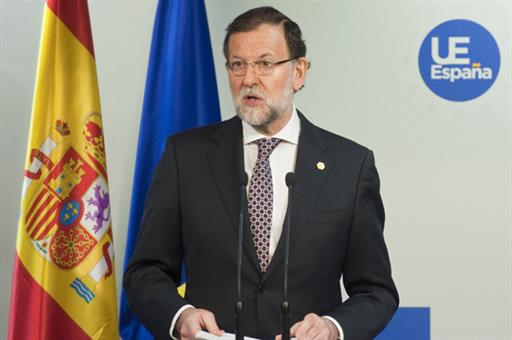Mariano Rajoy argues that Energy Union is "a milestone in European integration and a success for Spain"
President's News - 2015.3.20
European Council, Brussels (Belgium)
The President of the Government, Mariano Rajoy, started the press briefing following the European Council held in Brussels by reiterating his condemnation of the "savage attack" suffered in Tunisia and passed on his condolences to all the victims, particularly to the family of the Spanish couple, and to the Government and people of Tunisia.
As regards the European Council, Mariano Rajoy explained that this focused on the Energy Union because "Europe needs to guarantee secure, clean and affordable energy for its citizens". He added that "the price of energy seriously affects costs for our companies, and hence our competitiveness, as well as the pockets of our citizens through their gas and electricity bills".
The President of the Government declared that, despite the efforts made to harmonise regulations at a European level, the EU has fragmented energy markets, which is particularly serious in the case of Spain due to insufficient physical interconnections. The government has been working on this issue for some time now and has received significant support from the rest of its European partners, from the European Commission and from the European Central Bank, since the EU "has understood this problem for what it is, a European problem that requires European solutions", he explained.
In this regard, Mariano Rajoy expressed his satisfaction at the support received for the Madrid Declaration, signed on 4 March between the Governments of Spain, France and Portugal, in which they undertook to work on specific interconnection projects.
The European Council, said the President of the Government, also undertook to continue taking steps towards harmonising the regulation of the energy market and reducing emissions in this field.
Positive assessment of reforms undertaken in Spain
The European Council also approved the broad strokes of the economic policy proposed by the European Commission in relation to driving investment, structural reforms and fiscal responsibility. In this regard, Mariano Rajoy expressed his agreement since "these are the same pillars on which my government's actions are based", he underlined.
On this point, he highlighted that the European Commission has "very positively assessed" the agenda of reforms implemented in our country over the last few years. "In a short period of time Spain has gone from being a cause for concern to heading up growth in the major Eurozone countries". However, he added that "although the change in situation is more than noteworthy there is still a lot of work to do, both in Spain and in Europe as a whole".
With the aim of stabilising the economic recovery, consolidating the positive figures and ensuring the recovery filters down to all Spaniards, the Council of Ministers approved an "important structural reform" on Friday, geared towards job training, explained Mariano Rajoy.
This reform sets out a strategic plan to adapt the training of the unemployed to those economic sectors with the greatest growth, making the system more flexible, providing it with greater transparency and introducing the principle of 'competitive tendering'.
Transatlantic agreement and foreign policy
 EFEMariano Rajoy underlined that the European Council has reiterated its political intention to finalise the Transatlantic Trade and Investment Partnership agreement between the EU and the US before the end of 2015.
EFEMariano Rajoy underlined that the European Council has reiterated its political intention to finalise the Transatlantic Trade and Investment Partnership agreement between the EU and the US before the end of 2015.
The European Council also tackled the Spanish proposal to incorporate the Southern Neighbourhood of Europe - the Mediterranean - in its conclusions. Spain thus maintains, according to the President of the Government, its traditional position "to place the Mediterranean as a priority for European foreign policy. "The ministerial conference, to be held on 13 April in Barcelona, which Mariano Rajoy confirmed his intention to open, will be, in his opinion, a good opportunity to do this.
The situations in Ukraine and Libya were also dealt with at the Council meeting. As regards Ukraine, the 28 Member States reiterated the importance of swiftly applying the Minsk Agreements and decided that the restrictive measures applied against the Russian Federation should be linked to the degree and rhythm of compliance with these agreements. In parallel, they conveyed to the Ukrainian Government the need to continue with its political and economic reforms.
As regards Libya, the European Council reaffirmed its support for the Special Envoy to the Secretary General of the United Nations in his efforts to mediate between the parties with the aim of reaching a political solution. This solution, according to Mariano Rajoy, necessarily involves a ceasefire and the urgent formation of an inclusive national unity government that the EU undertakes to support.
Current affairs
During the Q&A session with journalists, the President of the Government, after describing Luis de Guindos as a "wonderful" Minister for Economic Affairs, expressed his support for him to head up the Eurogroup while remaining as the Minister for Economic Affairs of the Spanish Government.
As regards the elections in Andalusia to be held on Sunday, Mariano Rajoy underlined the "enormous" potential of Andalusia, where more than 8 million Spaniards live. He said that this land has been improving for over 30 years, as indeed has the rest of Spain, but "it can improve significantly more". It is possible to create 575,000 jobs if we maintain this economic policy over the course of the next legislature, he added. "We must strive to ensure that Andalusia reaches the same average employment rate as the rest of Spain. And this can be achieved", concluded Mariano Rajoy.





